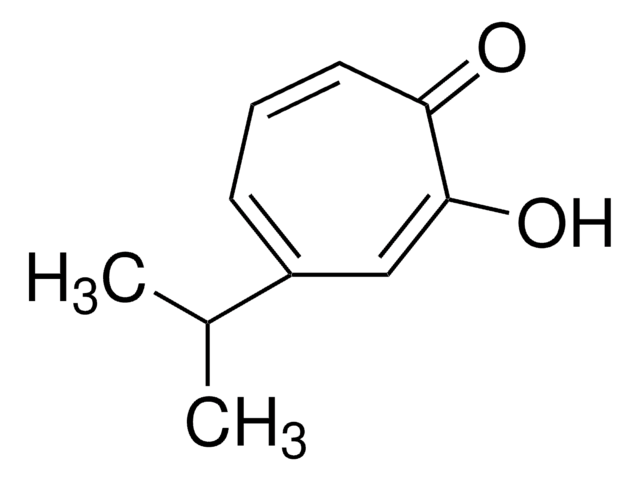W224820
4-Carvomenthenol
natural, ≥95%, FG
Synonym(s):
4-Carvomenthenol, 4-Terpinenol
About This Item
Recommended Products
grade
FG
Fragrance grade
Halal
Kosher
natural
Quality Level
Agency
follows IFRA guidelines
reg. compliance
EU Regulation 1223/2009
EU Regulation 1334/2008 & 178/2002
FDA 21 CFR 117
Assay
≥95%
optical activity
[α]20/D −27°, neat
greener alternative product characteristics
Less Hazardous Chemical Syntheses
Use of Renewable Feedstocks
Learn more about the Principles of Green Chemistry.
sustainability
Greener Alternative Product
refractive index
n20/D 1.478
bp
88-90 °C
density
0.931 g/mL at 25
application(s)
flavors and fragrances
Documentation
see Safety & Documentation for available documents
food allergen
no known allergens
fragrance allergen
no known allergens
greener alternative category
Organoleptic
herbaceous; woody; pepper
SMILES string
CC(C)C1(O)CCC(C)=CC1
InChI
1S/C10H18O/c1-8(2)10(11)6-4-9(3)5-7-10/h4,8,11H,5-7H2,1-3H3
InChI key
WRYLYDPHFGVWKC-UHFFFAOYSA-N
Looking for similar products? Visit Product Comparison Guide
General description
Application
- Quantification of six volatile oil constituents of Oleum Cinnamomi in rat plasma and multiple tissues using GC-MS and its application to pharmacokinetic and tissue distribution studies.: This study by Chi MY et al. focused on quantifying volatile oil constituents, including 4-Carvomenthenol, in rat plasma and tissues using GC-MS, providing insights into their pharmacokinetics and tissue distribution (Chi et al., 2023).
- 4-Carvomenthenol ameliorates the murine combined allergic rhinitis and asthma syndrome by inhibiting IL-13 and mucus production via p38MAPK/NF-κB signaling pathway axis.: This research by Bezerra Barros GC et al. demonstrated the anti-inflammatory effects of 4-Carvomenthenol in a murine model of allergic rhinitis and asthma, highlighting its potential therapeutic applications (Bezerra Barros et al., 2020).
- Fragrance material review on 4-carvomenthenol.: Bhatia SP et al. reviewed the use of 4-Carvomenthenol as a fragrance material, discussing its chemical properties, safety, and applications in the fragrance industry (Bhatia et al., 2008).
Biochem/physiol Actions
Signal Word
Warning
Hazard Statements
Precautionary Statements
Hazard Classifications
Acute Tox. 4 Oral - Eye Irrit. 2 - Skin Irrit. 2 - STOT SE 3
Target Organs
Respiratory system
Storage Class Code
10 - Combustible liquids
WGK
WGK 1
Flash Point(F)
174.2 °F - closed cup
Flash Point(C)
79 °C - closed cup
Personal Protective Equipment
Certificates of Analysis (COA)
Search for Certificates of Analysis (COA) by entering the products Lot/Batch Number. Lot and Batch Numbers can be found on a product’s label following the words ‘Lot’ or ‘Batch’.
Already Own This Product?
Find documentation for the products that you have recently purchased in the Document Library.
Customers Also Viewed
Our team of scientists has experience in all areas of research including Life Science, Material Science, Chemical Synthesis, Chromatography, Analytical and many others.
Contact Technical Service














